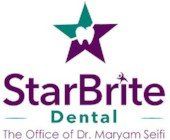Bad Breath (Halitosis)
Understanding Bad Breath (Halitosis)
Bad breath, also known as halitosis, is a common yet embarrassing issue that affects millions of people worldwide. It can impact social interactions, self-confidence, and even professional relationships. While occasional bad breath is normal, persistent halitosis can indicate underlying oral health problems that require professional attention.
Many people attempt to mask bad breath with chewing gum, mints, or mouthwash, but these solutions are often temporary fixes rather than long-term treatments. Chronic halitosis may stem from deeper dental issues, such as periodontal disease, dry mouth, or even systemic health conditions. Identifying and addressing the root cause is essential for effective treatment.
At Starbrite Dental, Dr. Maryam Seifi and her team specialize in diagnosing and treating bad breath at its source. With state-of-the-art technology and a patient-focused approach, they help individuals achieve long-lasting fresh breath and improved oral health. Whether it’s a professional cleaning, gum disease treatment, or personalized recommendations for home care, Starbrite Dental offers tailored solutions for every patient.
What Causes Bad Breath?
Bad breath can stem from a variety of factors, ranging from diet choices to serious medical conditions. Understanding these causes can help in effective treatment and prevention.
-
1. Bacteria in the Mouth
Gum disease is one of the most common causes of bleeding gums. The earliest stage, gingivitis, occurs when plaque and bacteria accumulate along the gumline, causing inflammation, redness, and bleeding. If left untreated, gingivitis can progress into periodontitis, a more severe form of gum disease that can lead to gum recession, bone loss, and tooth loss.
-
2. Dry Mouth (Xerostomia)
Saliva plays a crucial role in washing away food debris and bacteria. A lack of saliva due to dehydration, medications, or medical conditions can allow bacteria to thrive, leading to bad breath.
-
3. Diet Choices
A lack of vitamin C or vitamin K can contribute to gum bleeding. Vitamin C is essential for gum health, while vitamin K plays a role in blood clotting. Eating a well-balanced diet with leafy greens, citrus fruits, and fortified foods can help maintain gum strength.
-
4. Poor Oral Hygiene
Pregnancy, puberty, and menopause can cause hormonal fluctuations that make gums more sensitive and prone to bleeding. This condition, often called pregnancy gingivitis, is common and requires extra attention to oral hygiene.
-
5. Gum Disease and Infection
Certain medications, such as blood thinners, aspirin, and some anti-inflammatory drugs, can increase the likelihood of gum bleeding. If you’re experiencing this side effect, consult Dr. Seifi about potential solutions to protect your gum health.
-
6. Medical Conditions
Health issues such as GERD (acid reflux), diabetes, sinus infections, and liver disease can result in chronic bad breath. Identifying these conditions early can lead to better treatment outcomes.
How a Dentist Diagnoses Bad Breath
At Starbrite Dental, Dr. Seifi takes a comprehensive approach to diagnosing halitosis, ensuring that the underlying cause is properly identified and addressed. Diagnosis involves multiple steps, including:
-
Comprehensive Oral Examination & Health History
Advanced gum disease can damage the bone structure that supports teeth.
-
Professional Breath Tests
Bacteria from the gums can enter the bloodstream, potentially leading to infections in other parts of the body.
-
Salivary Gland Function Assessment
Since dry mouth (xerostomia) is a common cause of bad breath, saliva production is evaluated to determine if dehydration, medication, or other factors are reducing saliva flow.
-
Tongue and Tonsil Examination
Tonsils are the two oval-shaped masses at the back of the throat. As part of the immune system, they help protect the body from infections. Tonsils also harbor bacteria. This bacteria can help contribute to bad breath and can also get mixed together with food particles that then get stuck inside the tonsils’ crater-like formations. These particles then calcify and turn into tonsil stones. These stones are rarely harmful, but they can help cause bad breath, earaches, sore throats, and other symptoms.
The tongue is home to a significant portion of the bacteria that cause bad breath, particularly toward the back. This is why brushing your tongue and using a tongue scraper are important parts of your daily oral hygiene routine.
Dr. Seifi will assess the tongue’s coating and bacteria buildup during your consultation and your regular visits.
-
Identifying Underlying Conditions
If the cause of bad breath extends beyond oral hygiene, Dr. Seifi may refer patients for additional medical evaluations.
Treatment Options for Bad Breath
At Starbrite Dental, we offer advanced, patient-focused solutions to address bleeding gums and restore your oral health.
-
Professional Dental Cleanings
For patients with early-stage gum disease, deep cleaning removes plaque and tartar buildup below the gumline. This non-surgical treatment helps reduce inflammation and prevent disease progression.
-
Gum Disease Treatment
We utilize advanced laser dentistry to target infected tissue while preserving healthy gums. Laser treatment promotes faster healing, reduces discomfort, and enhances gum regeneration.
-
Saliva-Stimulating Therapies
Dr. Seifi and our team will develop a customized oral care plan, providing expert guidance on brushing techniques, flossing methods, and recommended oral care products.
-
Prescription Mouthwashes and Toothpastes
Unlike over-the-counter mouthwashes that only mask odors, prescription antibacterial mouthwashes and fluoride toothpaste help eliminate odor-causing bacteria at the source.
-
Lifestyle and Dietary Adjustments
Patients receive expert advice on making small but effective changes to their diet and lifestyle. This includes reducing acidic foods, sugary snacks, and strong-smelling foods while incorporating more water, fresh produce, and probiotics.
-
Tongue Cleaning and Specialized Oral Hygiene
Since a large percentage of bacteria causing bad breath live on the tongue, tongue scraping and targeted oral hygiene practices are incorporated into treatment plans.
At-Home Remedies & Prevention
-
Brushing & Flossing Techniques
Advanced gum disease can damage the bone structure that supports teeth.
-
Tongue Scraping
Bacteria from the gums can enter the bloodstream, potentially leading to infections in other parts of the body.
-
Hydration & Saliva Stimulation
Drink plenty of water and chew sugar-free gum to keep saliva production up.
-
Probiotics for Oral Health
Oral probiotics help balance bacteria in the mouth, reducing odors and promoting a healthier oral microbiome.
-
Avoiding Certain Foods & Habits
Quit smoking and limit alcohol intake to prevent dry mouth and bacterial overgrowth.
When to See a Dentist
If you experience persistent bad breath despite good hygiene or notice symptoms such as bleeding gums, dry mouth, or frequent throat infections, it’s time to schedule an appointment.
Starbrite Dental’s Approach to Treating Bad Breath
At Starbrite Dental, Dr. Maryam Seifi and her team take a comprehensive, patient-centered approach to treating bad breath. Their goal is to eliminate halitosis by addressing its root cause, not to mask it.
-
Comprehensive Exams and Diagnosis
Advanced gum disease can damage the bone structure that supports teeth.
-
Personalized Treatment Plans
Every patient is unique, and so is their treatment plan. Depending on the cause of bad breath, treatments may include:
Professional deep cleaning to remove plaque and bacteria
Gum disease treatment if periodontal infection is contributing to bad breath
Saliva-stimulating therapies for patients experiencing dry mouth
Nutritional and lifestyle advice to reduce odor-causing food intake
-
Advanced Technology for Breath Analysis
Drink plenty of water and chew sugar-free gum to keep saliva production up.
-
Ongoing Support and Maintenance
Patients receive guidance on maintaining fresh breath, including personalized home-care routines and regular follow-up visits to monitor progress.
-
Avoiding Certain Foods & Habits
Quit smoking and limit alcohol intake to prevent dry mouth and bacterial overgrowth.
Frequently Asked Questions (FAQ)
-
What causes bad breath even after brushing?
Occasional minor bleeding can occur if you’ve just started flossing regularly. However, persistent bleeding is often a sign of gum disease and should not be ignored.
-
Can bad breath indicate a serious health condition?
Yes! Early-stage gingivitis can be reversed with improved oral hygiene, professional cleanings, and proper home care. However, advanced periodontitis requires more intensive treatment.
-
What’s the fastest way to eliminate bad breath?
Maintaining good oral hygiene, using a soft-bristled toothbrush, rinsing with salt water, and increasing vitamin C intake can help reduce gum inflammation. However, professional treatment is necessary if bleeding persists.
-
How does smoking affect breath odor?
Patients with gum disease should visit every three to four months for specialized periodontal care rather than the standard six-month checkup.
-
What foods help prevent bad breath?
Yes, stress can weaken the immune system and increase inflammation, making the gums more susceptible to infections and bleeding.
-
Can stress cause bad breath?
Yes, smoking and excessive alcohol consumption can dry out the mouth, reduce blood flow to the gums, and increase the risk of gum disease.
-
How can I test my own breath?
Try the lick test: Lick the back of your wrist, let it dry, and then smell it. Alternatively, use dental floss and check for any lingering odors.
Get Expert Bad Breath Treatment in Rockville, MD
If you struggle with chronic bad breath, Starbrite Dental is here to help. Book an appointment with Dr. Maryam Seifi today and take the first step toward fresher breath and a healthier smile.
Contact Us To Schedule An Appointment Today!
*We DO NOT ACCEPT HMO Insurance, State Insurance, Medicaid/Medicare, or discount plans. Fees apply for services.
Evening and Weekend Hours Available
- Monday
- Closed
- Tuesday
- -
- Wed, Fri
- -
- Thursday
- -
- Saturday
- -
- Sunday
- Closed
Office
(301) 770-1070
Fax (301) 770-0544
301-888-5785
301-889-9291 | 301-889-8366 | 301-756-5406
Content reviewed by the
Our website is presented strictly for informational purposes. Nothing here is intended to be a substitute for professional medical advice or for the diagnosis or treatment of a medical condition.
If you have questions about your health you should seek the advice of a qualified health professional. Do not delay or disregard professional advice because of something you may read here.
Payment options through Cherry Technologies, Inc. are issued by the following lending partners: https://withcherry.com/lending-partners
All Rights Reserved | StarBrite Dental, the Office of Dr. Maryam Seifi
Website designed and maintained by Xpress, INC


